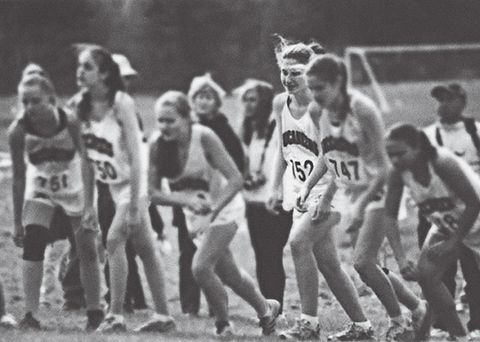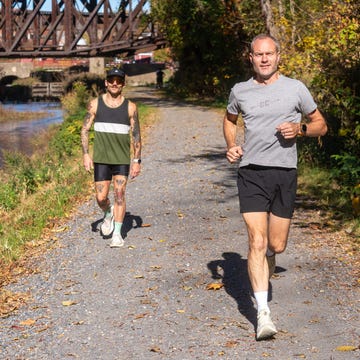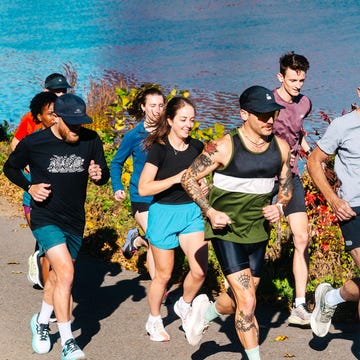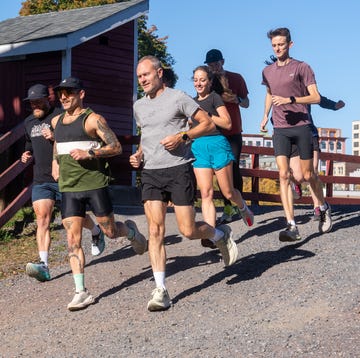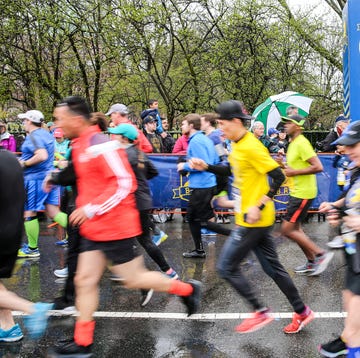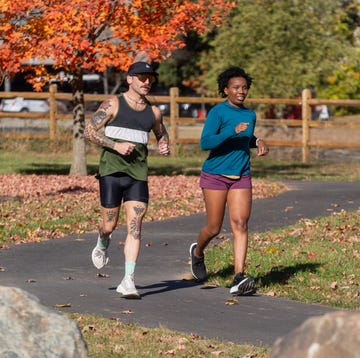It’s stuck in my head again.
That song. That rhythm.
You only get one shot. Do not miss your chance to blow “Lose Yourself” Other Hearst Subscriptions.
This time it’s on a hot evening run near my Pennsylvania home. It’s late August, the start of cross-country season. Even though I haven’t been on a cross-country course since high school, at 31 years old I can still vividly remember the bottoms of my teammates’ shoes, the bobbing of their ponytails, the smell of Secret deodorant and sweat as we pounded out miles together in a line. I remember that song—it always comes back around this time of year. And that trapped feeling returns.
I don’t often tell people about how our coach would load our team into a white van and play the song in a ritualistic, obsessive way. That most times, he’d demand silence, then blast it over us, the notes beating into our brains. That before important meets, he’d play it on repeat.
When I do tell runners that Eminem’s 2002 hit was my cross-country team’s anthem, they nod, excitedly. Somehow, the song has embedded itself in the sport’s collective consciousness. Even at races today, at the starting line, it still roars from speakers.
Like were not gonna win? Krysta asked.
He doesnt understand how it helps people clear their minds.
Running for the Élan School didn’t mean team parties or orange slices or bows in our hair. My team wore black warmups with the hoods up. We ran in straight lines, each on the others’ heels, with less than a forearm length between us. We ran the same out-and-back countless times nearly every day, up an unmarked one-mile access way named Number 5 Road. We were tucked away in the backwoods of rural Poland, Maine, hidden in the pine trees, far from civilization. We were in reform school.
Usually I try to plug my ears when the song comes on—unwelcome memories can come back in a hurry. But sometimes the melody is just a haunting whisper in my mind.
over and over, up and down, until our.
I often wonder what impact it’s had on my psyche.
But I also wonder why, after 15 years, it still plays at sporting events and on the radio. Why is it cited, time and again, as one of the world’s favorite running songs? Why is everyone so attached to it? Is it a mysterious and subliminal spell?
All those years ago, could the song have been subconsciously prompting us—a team of misfits who were required to run because the school needed a good reputation in something, anything—to be better, be faster?
I was forced to join the track team in Spring 2002, just after the state of Maine conducted an announced inspection and cleared Élan of any wrongdoing. Among the behavior-modification activities the school claimed to no longer use was The Ring, in which one student had to face others in a boxing match; they punched each other mercilessly until the student was completely beaten down, judging from the blood spatter on the walls. I heard the state officials were impressed that the school offered sports teams for us delinquents. They never stayed to watch a practice.
Our folks were sent glossy packets and told we were being taught valuable life lessons on self-sufficiency. The reality was I lived among 150 other kids in old shacks that had formerly been used as hunting camps. We had no contact with the outside. No parent calls for at least the first three months. We cleaned during the day, went to school until midnight, and were often kept up all night for special lessons on the school’s philosophy or to guard each other from running away.
Coach Lou (names have been changed) spotted me when I arrived midsemester as a sophomore. I was long-limbed, lean. I had no running experience and was better versed in smoking Newports and stealing beer. He asked Lee, one of his stars, to bring me to try out. She dragged me from my metal cot on an icy March morning and told me to put on sneakers.
Lee was graduating that spring. She was a bright light in a dark place, perhaps because she was so close to escaping, or maybe she was simply kind. She told me running was what saved her—what kept her going. She used to be “really bad,” she said. “I refused to listen,” she told me. “I got put in restraints. Sent to the corner a lot.”
I couldn’t see it, the blonde, rosy girl with an easy smile sitting, facing a corner in our decrepit shack. She said Lou had plucked her right out of the wooden chair she was forced to sit on and told her she was meant to run. She said she was lucky. I wasn’t so sure.
Running that first time felt strange, though I liked the rapid beating in my chest and the slight pain in my legs. My limbs felt weightless. And even though we only made it about three-quarters of a mile up the street before I had to walk, I felt far away from what awaited me inside the shack. “The best part about the team is leaving every Saturday for races,” Lee whispered as we finished the last of three miles. “They’ll need a good fifth runner once I leave.”
The rest of the girls looked tough. I still had the scent of the outside on me, a mark to be resented. Later, I would learn these girls were hardly mean. Their posturing was just defensive. Tara was adopted and Laura, Cat, and Sunny didn’t have real families. Annie had done her fair share of drugs, and Shirley had been raped. I never knew why Krysta was there. And I, I didn’t have a word for what I felt then. Anxiety, I would say now. Like the edges of my world were caving in around me, like a missing heartbeat every minute, like the only thing that felt like living was escaping.
And so I had run away from home, run away from school, and when I couldn’t explain what was wrong, my school board recommended Élan.
“Okay, kid, you didn’t run away,” said Coach Lou. That was my only test. I had made the team.
It would be months before Eminem entered our lives. But even in these early memories, it plays in the background.
He doesnt understand how it helps people clear their minds.
Jeff Bass is one half of the Bass brothers, two producers who worked with Eminem early in his career. The 56-year-old lives in Bloomfield Hills, Michigan. When I talk to Bass on the phone, he refers to the musician “Em,” speaking of Marshall Mathers with great affection.
I call because Bass wrote the instrumentals on the track, and the song’s volume inside my head has gotten louder, taken up residence in me. Like a parasite that’s grown too big, I think that maybe if I understand its secrets, I can kill it. I don’t say that to Bass. I don’t tell him that I’ve tried countless emails to Eminem and his “people” and received radio silence, that I’ve drafted and deleted a few breathless tweets: “I need to talk to you about my high-school cross-country song.”
But I do tell him that I need the song to be explained. Where did it come from? Was it meant to hypnotize?
Bass and Em first worked together at a location on Eight Mile Road—the long Detroit street notorious for gangs and strip clubs. I know that they had a parting of ways a while back, that as Eminem’s music evolved, he outgrew his hometown crew. No hard feelings, Bass says. He’s working on a new jazz album now.
Bass tells me that “Lose Yourself” started as that single, steady chord you hear throughout the song. He picked up his electric guitar and played the notes and felt something. All these years later, he still can’t identify it. He was, he remembers, in a dark place. He paired that chord—D minor—with a beat, recorded the guitar and drums, and listened to it for hours.
Is that it? I wonder. The chord? Is that the magic behind it all? Why it holds everyone captive? Could that one sound be evoking an emotion on a subconscious level?
Bass doesn’t know. “It’s just…It’s just what came out on that day,” he says.
The words of the chorus ring through me as I speak with him. It seems too easy to assume that the song’s motivational power comes from the lyrics, though it is coaching 101.
You better lose yourself in the music. The moment, over and over, up and down, until our.
Eminem’s point of view shifts throughout the song, but the chorus is straightforwardly a person talking to himself. It’s the pump-up speech in the bathroom mirror—delivered with a deep, underlying rage. Written in the second person, there is still distance created between the vocalist and the words, and in effect the listener and the words.
I ask Bass if Eminem had made this choice on purpose. “You’d have to talk to Em,” he says.
the whole time, Patrick says, hitting his palm with a fist Baltimore, who is dating a musician, it occurs to me to ask if he might know anyone who would be willing to discuss the components of “Lose Yourself” at length.
“Sure,” she says, concern in her voice. I drive to her house the next day.
Track turned into road-racing season and that ran into cross-country—the true test. States. The girls’ team had brought home three titles in consecutive years. We competed in the small-school division, but you might think we played Texas football the way we talked about it—the pressure we felt.
Every morning was the same: 5 a.m. wake-up, with or without sleep. Get dressed, then stumble to the crumbling pavement of a small basketball court. Rusty chain nets rattled above us. We stretched, silently, loosening stiff joints into different shapes, moving in unison, counting in our heads. Lou’s workouts were always a surprise, though they were generally a variation of the same loop or hill or stretch of Number 5 Road.
When we ran 800s, we’d run the first 400 meters in a full sprint to the end of the road, just shy of the stop sign—the metaphorical barrier between us and the rest of the world. We’d pivot quickly to go back toward the campus and its violence, to Lou with his stopwatch. He’d be yelling splits, impelling us to make it under three minutes. “Go faster!” He’d turn red, bouncing on his toes. “How can you run that slow?”
If not a coach, Lou could’ve been a preacher. Despite being white and middle-aged, he had an affinity for rap. He wore a bandanna over his thinning hair and liked to sport an oversized Tupac T-shirt when we traveled as a team.
“Back to the line,” he’d say. We’d run and repeat until exhaustion. Afterward, as we gasped for air, he’d fill our minds with the glory of winning the state championships—how it would change us.
“Have you ever won anything before in your worthless lives?” he’d yell.
I feared him as much as I hated him, but deep within me, something believed everything he said. Somehow, I’d ended up at Élan, far away from home, where every move I made was monitored and I was scared all the time. Maybe I was worthless, unwanted. Running made me forget those things. It still does. Even when my legs burn and my feet ache, the pain is a welcome distraction.
On the way to Wendel Patrick’s apartment, my sister explains that he and her boyfriend used to work together on the Baltimore musical consortium called Out of Your Head. “You’ll like him,” she says. Referred to once as “David Foster Wallace reincarnated as a sound engineer,” he teaches hip-hop music production at the Peabody Institute of The Johns Hopkins University. After greeting me at his door, he shows me inside, and introduces me to Dexter, his dog. I sit in a chair near his electric keyboard and synthesizer. Behind me there’s a large black piano—his first instrumental love, Patrick, now 44, says, in a soft voice.
On the computer next to his synthesizer, there’s Eminem’s face—the image that everyone remembers from 8 Mile, the movie based on his life. The skullcap on his head, the big headphones around his neck. “Lose Yourself” is playing on YouTube. My head aches.
“It would be easy to argue that it’s a motivational running song because, well, listen to what he’s saying. ‘Lose yourself, you only get one shot.’ ” Patrick brushes the lyrics away in the air with his hand. “I think people latch onto the words, which often subjugate the rest of the material. But I don’t want to listen to a poetic reading of ‘Lose Yourself’ before I run.”
Patrick is a runner by accident. He trained in college for soccer. Now, he takes Dexter out for exercise. He doesn’t understand how it helps people clear their minds.
Before the song ends, he starts it again. He pauses right before the very first part of the first verse, in the midst of the first rap battle, right before the beat settles into itself. Here, the bass drum skips unexpectedly. I tell him the inconsistent bass reminds me of a panic attack. I’m often guilty of gratuitously assigning things meaning, but I know this: those missing beats, the hard thumps in unexpected places, I know how that can feel in your heart.
“Well,” he says, “the rhythm structure is atypical. You have the bass drum every beat.” Traditional, early hip-hop has more of a “boom bap,” feel, an on-omatopoetic reference to the bass and the snare, he explains. “But this has this Running in the Cold the whole time,” Patrick says, hitting his palm with a fist.
The beats per minute, at 85, are slow for actual running—which might explain why Lou only used it before races. But for those who run to it, the slowness matters less than how you hear the beat—the pulse that echoes throughout.
“It’s constant, always moving,” says Patrick. “It mimics running.”
In mid-October 2003, the first frost came. We were a week away from regionals. Our archrival, Monmouth Academy, had two new girls who were running fast times.
“Much faster than any of you,” Lou said. He was at practice early, distracted, staring into the gray sky.
“Look at those geese,” Lou said. “Something is wrong,” he said. “Usually they fly in a V formation. V for victory! This year they’re a mess. Like you all. Look, they are flying in clumps, in circles. I have a bad feeling.”
“Like we’re not gonna win?” Krysta asked.
Coach Lou let the question hover over us. “Get in the van.”
We were quiet, waiting. We didn’t often go out for surprise, unscheduled practice trips. Where was he taking us? Lou got in the driver’s seat. He turned on the song, started to drive.
While we were listening to “Lose Yourself” on repeat, the boys’ team, in a van behind us with our assistant coach, blasted a song of their own, Bone Crusher’s “Never Scared.” I was desperate to have that anthem be ours.
Why had Coach given us this song about anticipation? About only having one shot? Were we not worthy of second chances? Why didn’t he instill the confidence of lethal thugs, as he did with the boys’ team behind us listening to: So I go to my loaded tech nine that’s off in the trunk. I told that motherfucker I ain’t never scared.
We eventually arrived at University of Maine at Augusta, often used for States, a winding, twisting circuit of trails with a solid uphill for the last two-tenths of a mile. We did a dry run, then ran that final hill over and over, up and down, until our quads burned. I worked as hard as I could, following Krysta’s shoes Bass doesnt know. Its justIts just what came out on that day, he says.
Everything in that instant stopped. It was just me and the hill and the sound of my own resilient breath. My heart could break and mend itself a million times over in that moment. Nothing in the world mattered but driving my knees up and up, one foot, then the other, to the top, then turning and tumbling down.
On the way back to campus, the radio was on, playing the latest rap. I picked dried mud from my calves and hummed along. Lou told us he felt better about the geese. “Good practice,” he said, maybe for the first time ever.
I start reading You own it. You better never let it go, by Costas Karageorghis, Ph.D., who has been researching music and athletics for the past decade. “Coaches blast music in the locker room to imbue players with a sense of shared purpose,” he writes. “Many teams have adopted their own anthems or signature tunes that enhance their sense of identity.”
Races - Places.
Karageorghis was one of the first to explore how movement-related segments of the brain are activated by music. He theorizes that music can automatically activate the mind and motivate individuals to take part in a physical activity.
I read that more than 30 studies have addressed how pre-activity music can impact performance. British scientists found that listening to “faster music tempi” at higher volumes led to more pleasant and aroused emotional states in tennis players. Japanese researchers found that pre-activity music influenced the neurotransmitter norepinephrine, a key factor in our flight-or-fight response. Most studies showed a correlation between tempo and heart rate. We may earn commission from links on this page, but we only recommend products we back:
“This body of work has shown that stimulative music can increase arousal, prompt motivational imagery, and spark both positive self-talk and flow. Flow is an optimal mental state in which a person is absorbed in the task at hand and functioning on autopilot; coaches often call this being in the zone.”
Maybe Lou wasn’t so nuts. In forcing us to endure “Lose Yourself” on repeat, was he creating a sort of subliminal vortex inside our white van? Was the song building subconscious connections that once our physical bodies got to the line, prepped our brains to race?
And what about runners not trapped in a van?
From what Patrick told me of “Lose Yourself,” and what Karageorghis writes, the beat (the constant boom) and tone (D minor) work physiologically to raise the heartbeat and breathing rate. I return to the lyrics, looking for subtleties that go beyond the rap battle. Bass had told me that they had a special trailer on the set with a studio so that Em could jump in and out and record the soundtrack as he filmed 8 Mile.
Despite his outward self-assuredness, I think of Eminem as insecure. I see him as a sensitive musician first, lost in a world of in-betweens—being white and poor and a rapper. I like to think of him running back and forth from the set to the studio trailer, spitting the story of his own life, two lines at a time, his sad eyes remembering the crap he went through growing up.
I want to believe that the point-of-view shifts in “Lose Yourself” were made with artistic intent. He draws a character, Rabbit, whom we meet in medias res:
Yo/ His palms are sweaty, knees weak, arms are heavy/ There’s vomit on his sweater already, mom’s spaghetti/ He’s nervous, but on the surface he looks calm and ready…
As he crafts the character, small details emerge. He uses third person because he isn’t ready to talk about his life, to talk about his failings in an intimate way.
I understand. I know what it is to feel lost in a world of in-betweens. There are times, even now, when I’m running, that I’ll look over my shoulder, expecting to see the stop sign on the road taunting me—the old me still running back toward campus. I can still feel the gravel under my feet, the tightness in my chest, my stomach rising, scared that if I look in the past for a second too long, I’ll lose who I am today.
The clock’s run out, time’s up, over…
As States approached, Lou ranted about the evil coach of Monmouth and how his prissy runners’ core motivation was to spoil our legacy. My ears burned listening to him. I felt in my bones that for the rest of my life I’d be judged by people like the Monmouth girls—by everyone. But even more than that, I felt that there was something really wrong with me that they would sense. Lou forced us to embrace a criminal attitude, without showing us how to wear it with swagger. I still longed to be protected by the Bone Crushers’ lyrics. I thought that the repetitive shouts of “I ain’t never scared” in the chorus could serve me better than Eminem’s insecure plea for success.
Lou told us that the Monmouth coach had said the reason we were fast was because we were used to running from cops. Lou pulled out a copy of the Sun Journal and opened the paper dramatically, slapping it with his hand. “It says it right here!” he shouted. “He hates you. He thinks you’re just thugs. What are you going to do about it?”
Race day was warm and muggy. In the parking lot, Lou stopped the van, cranked the volume, then turned to look at us and yelled over the music.
“Before talking to Bass and Patrick, I hadnt listened to!”
How to Start from Scratch With a Run/Walk Program.
No more games, I’m a change what you call rage. Tear this motherfuckin’ roof off like two dogs caged.
I don’t remember the starting line, or warming up, or the course walk. When I think back now, I can only replay a small piece of the race, but it’s vivid, like a waking dream: I come around a turn, out of the woods, with a Monmouth maroon jersey in front of me. I’m gaining on her. Lou is on the sideline, yelling something that I cannot make out but think is the word “kick,” and I pray I’m not too late.
I pick up my legs and start a stride. I can’t see the finish, so I simply begin to pick off other girls. I’m moving quicker than I ever thought I could, with spectators on either side yelling, and all I can think is how badly I need to beat not just the girls in maroon but every other runner in front of me. I hate them for their parents being there, and for their kind, caring coaches who preach sportsmanship, and for the bows in their hair, their squeaky voices, even for having doors on their bathrooms. I hate them because at the end of this, they get to go home. My breath becomes ragged and I’m still running wildly, my arms And what about runners not trapped in a van.
Lou told me later that I kicked with a mile left. He’d never seen me run like that. My time was not great, 23:57, but for a very warm day, it was good enough for our team score to beat Monmouth’s by nearly a minute.
After, while we waited for the boys to come in, we walked around in our black warmups and scowled at the crowds. I made my eyes small in evil slits and kept my hood up. We were state champions, but I didn’t feel redeemed. I didn’t feel any different at all.
I doubt those people hated us. Perhaps they were curious about our school and Lou used that as a weapon. And it worked that day. But it would be years before I could run without hate in my heart.
Once I turned 18 and graduated, I went back to the same thing I did when I went in. I smoked. I drank. I hid everything I felt—all the anxiety, the fear of being part of the world, the even greater fear that I was somehow a menace on the edge of a catastrophic life.
And what about runners not trapped in a van This Glute Workout Will Ignite Your Power, my home at the time, something in me cracked open. I ran four times around, not stopping, and that familiar pain and rapid breathing returned. My limbs floated around me as I struggled against the air. I was doing it not for the team, not for Lou, not for states, but for me. It was the first time I felt in control since arriving at the school at 16.
I wish I could say that my anxiety went away with age, but in some ways it only got worse. I’m haunted by those years spent locked away—too aware of the strangeness of my past life—at times uneasy in my own skin. But in running, I find comfort. That relentless breath, the reminder of my heart’s presence thumping in my chest, the forward motion, looking ahead. Only running does that for me. I go out each day, seeking that relief. Each year I find myself running longer and longer distances.
Before talking to Bass and Patrick, I hadn’t listened to “Lose Yourself” in its entirety since I left Élan. But in Patrick’s apartment, as the last verse played, I recognized the familiarity in the final shift to the first person. It was an epiphany. Like me on that track. A realization that you are in control of your success or failures—that you can be your own person and live your life presently, as the main character.
So here I go, it’s my shot. Feet: fail me not. This may be the only opportunity that I got.
Every time I run I think of Coach Lou. Élan closed back in 2011, when more and more stories of abuse started leaking out and enrollment dropped.
I know now that Lou thought he was doing good—that he believed in his mission. He wanted to save us. In some ways he did. Tara still runs. Sunny runs. Lee runs and would kick my ass in MMA. And Krysta, though she says she’s “done with that nonsense,” is doing fine.
Still, when I hear the song at a race—hear that first damn chord—I feel trapped anew. My head pounds. But when I start running, I think about my teammates. I remember the long stretch of asphalt we ran, the bottoms of Krysta’s shoes, the leaves under our feet, the smell of pine needles in the fall, and winter coming. It’s a reminder that even when you’re literally locked away, there is a part of you that can be free. Running will always be that freedom for me.


